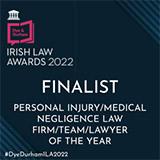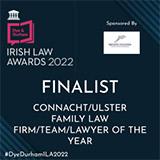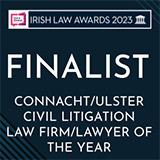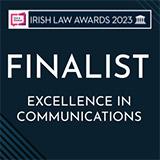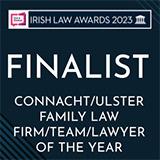INTRODUCTION:
Injury to the Brain can result from various causes but, from a legal point of view, we concentrate on the most relevant one, namely traumatic brain injury, i.e, injury caused by way of a trauma.
The main causes of traumatic brain injury are road traffic accidents, falls, assaults, occupational injuries and recreational accidents. Motor cyclists are at a greater risk than other motor users and pedestrians are at a greater risk still.
Where mild traumatic brain injury has occurred, recovery occurs but, in more severe cases, there can be ongoing cognitive, emotional and behavioural consequences.
BERWICK SOLICITORS EXPERIENCE IN BRAIN/HEAD INJURIES:
Berwick Solicitors in Galway have considerable experience in this area:-
Contact: Berwick Solicitors, 16 Eyre square, Galway. Ph; 091-567545 or email: info@berwick.ie.
TRAUMATIC BRAIN INJURY: MORE INFORMATION
These occur as a result of an accident, typically road traffic Accidents. The head might be banged against the dash of a car; or, the head might be shaken violently.
The skull provides some protection to the brain but it is somewhat like an eggshell; if one violently shakes an egg, damage is caused to the inside of the egg, even though the shell of the egg is not damaged. In the same way, severe injury can be caused to the inside of the brain (which is a soft gelatinous structure which floats inside the skull in a fluid) which is protected by the skull. Also, the Brain can be caused to rotate within the skull, which can cause bleeding and other injury.
Injury to the brain can also be caused then the head bangs against a hard object (as against the car-dash outlined above or where one falls heavily onto a floor in a slipping- accident). In these situations, the brain is injured by virtue of the initial contact (called the “ coup injury”). Further injury can be caused by virtue of the movement within the brain, resulting in the “contra coup injury”.
LOBES OF THE BRAIN:
There are four lobes in the brain namely; Frontal Lobe, Temporal Lobe, Parietal Lobe and Occipital Lobe.
Each Lobe has its functions, so that the consequences of brain injury will partly depend on which lobe/lobes is/are injured.
Temporal Lobe: This largely controls memory and auditory information. Injury to this part of the brain can result in short -term memory, difficulties, limitations in the sense of smell and taste and vestibular problem as well as multi-tasking.
Parietal Lobe; This controls sence of touch and also our ability to read.
Occipital Lobe: This area deals with the processing of visual information.
BRAIN INJURY: INITIAL ASSESSMENT AND TREATMENT
Immediate Emergency Care/Hospital Diagnosis
Initial emergency care concentrates on making sure that the injured person has sufficient supply of blood and oxygen; also maintaining blood pressure and preventing any further injury to the head or neck.
The Medics will also focus on minimizing any injury that might result from bleeding or reduced oxygen supply to the brain.
Initial Diagnosis:
As traumatic brain injuries are usually an emergency (and ,because patients can swiftly deteriorate in condition), doctors need to assess the patient rapidly and accurately. This test (see details below) helps the medical personnel to quickly assess the severity of a brain injury. Obviously important are the following:-
How did the Injury occur?
How did the person lose consciousness?
How long was the person unconscious?
Where was the head struck?
How forceful was the injury?
Was the person’s body whipped around or severely jarred?
Initial Management of Condition:
Typically, in the West of Ireland and smaller Hospitals, for severe cases, patients need to be brought to Dublin by transport. Typically, they will be accompanied by an expert doctor who will monitor the patient in the journey and will maintain proper levels of pressure, breathing etc,. This is a difficult task for a Doctor; if there were shortage of Personnel, problems can result.
Medication:
Various medications are used immediately after brain injuries including:
- Diuretics: to reduce pressure inside the brain
- Anti-seizure drugs : these are given to avoid any possible additional brain damage that might be caused by a seizure.
- Coma – inducing drug : this is done as brains in a coma use less oxygen and this might be suitable where the brain is struggling to provide oxygen.
Surgery:
Urgent surgery might be needed such as:-
- Removing blood clots (hematomas) – this surgery is to remove clot of blood from the brain and can put pressure on the brain and damage the brain
- Repairing skull fractures
- Opening a window to the skull – usually to reduce pressure in the skull
ESTIMATING SEVERITY
Diagnosis: mild-to-moderate head injury:
It can often be difficult to diagnose the mild to moderate head injury and signs would often be tiredness, headaches, dizziness, difficult thinking, memory, concentration, word- finding, behaviour- problems or anxiety. Often people return to work and then find they are not able to perform, requiring them to receive further treatment.
Definition of mild head injury:
A mild head injury would comprise of the following:-
- Any period of loss of consciousness.
- Any loss of memory for events immediately before or after the accident or
- Any alteration or mental state, such as feeling days or concussed.
- Facial neurological deficits
Provided that the injury does not exceed the following:-
- A loss of consciousness of thirty minutes.
Estimating Severity:Crucial measures:
- Coma – the duration of this is most important. If it is greater than one month, this indicates poor outcome.
- Post-traumatic amnesia; – Less than one hour is mild. Greater than four weeks is very severe.
- MRI -will detect deep liaisons and surgeons are able to detect deep liaisons and surgeons are able to detect from liaisons likely permanent damage
Summary:
-
Depth and Duration of the Coma and the duration of the Post-Traumatic Amnesia (PTA).
-
Glasgow Coma Scale is most often used as a measure of impairment of conscious level.
As regards Amnesia – Retrograde Amnesia refers to the period when the Amnesia begins (before the accident/injury) and then goes to some point after the accident/injury, referred to as Ante-rograde Amnesia or Post-Traumatic Amnesia. It is PTA which is most important, rather than Retrograde Amnesia. The Assessment of PTA is quite difficult and requires more skill than Glasgow Coma Scale Assessment and is usually done some time after the initial assessment.
Glasgow Coma Scale: (See information on this below)
Imaging Tests:
CT Scans are used (Neurosurgeon and Neurologists find them more useful than MRI Scans). The CT Scan uses a series of x-rays to create a detailed view of the brain. A CT Scan can quickly show fractures and show any bleeding in the brain (hemorrhage) blood clots (hematomas), bruised brain tissue (contusions) and brain tissue swelling.
MRI Scans are used sometimes and can give more detailed information but are not as flexible for doctors and MRI Scans take too long and are more expensive. Also, PET Scanning is useful for quantifying the extent of brain damage.
Cranial Pressure Monitor:
The pressure in the brain needs to be monitored very closely and a probe can be inserted into the brain to monitor this pressure.
Glasgow Outcome Scale:
This has a 15 point scale
- The Glasgow Outcome Scale – is widely used and very well established to measure outcomes and has the following categories:-
1. Death – severe injury or death without recovery of consciousness
2. Persistent Vegetative State – prolonged state of unresponsiveness and a lack of higher mental functions.
3. Severe Disability – severe injury with permanent need for help with daily living.
4. Moderate Disability – no need for assistance in everyday life, employment is possible and may require special equipment.
5. Low Disability – light damage with minor Neurological and Psychological Deficit.
Children;
- Doctors find it more difficult to assess children
- More likely to suffer delayed or prolonged increase in brain pressure.
- More difficult to read the scans for doctors
- Formerly thought that children recovered better but this no longer thought.
COMPLICATIONS:
The following complications can be caused by a traumatic brain injury:-
Altered Consciousness:
- Coma: this results from extensive damage to parts of the brain and, after a number of weeks, the person may emerge from the coma or enter a vegetative state.
- Vegetative State: This might happen if there is extensive injury to the brain, where the person is not aware of his or her surroundings and may be barely able to open eyes, make sounds etc.
- Minimally- Conscious state: Here, the person has some since of self-awareness and awareness of environment.
Fluid build up:
- Fluid may build up on the brain and this can result in increased swelling and pressure.
Infection:
- Bacteria can enter the brain and cause infection.
Blood vessels:
Nerve damage:
- The following can result:-
- Loss of Vision
- Loss of facial sensation
- Swallowing problems
- Eye movement problems
- Facial muscle problems.
Cognitive Problems:
The following type of problems can result:-
- Problem solving
- Reasoning
- Learning
- Memory
- Judgment
- Attention or concentration
- Multi-tasking
- Organization
- Decision making.
Communication Problems:
As you will see from the list below, it is not surprising that these problems result in conflict with spouses, family members, difficulty in organizing their lives and getting on with it:-
- Difficulty speaking or writing
- Problems understanding speech or writing
- Trouble in following conversations
- Problems with expressing complicated emotions and attitudes
- Difficulty in using the muscles needed to form words (Dysarthria)
- Problems organizing thoughts and ideas.
Behavioural Problems;-
- The following sometimes result from dramatic brain injury:-
- Problems in social situations
- Physical or verbal outbursts
- Problems with self -control and risky behaviour
- Inaccurate self-image and poor awareness of abilities.
Emotional Changes:
These might include:-
- Mood swings
- Irritability
- Lack of understanding/appreciation of others
- Anger
- Insomnia
- Depression
- Anxiety
Sensory Problems:
- These might include:-
- Difficulty recognizing items
- Line spots or double vision
- Bitter taste or a nasty smell
- Skin tingling, pain or itching
- Trouble with balance or dizziness
- Impaired hand – eye coordination
- Ringing in ears
Degenerative Brain Diseases:
A traumatic brain injury can increase the risk of degeneration of the brain, including:-
- Alzheimer’s Disease, resulting in gradual loss of memory and other thinking skills
- Parkinson’s Disease, resulting in problems with movement, such as tremors
- Dementia Pugilistica – often resulting from Boxing (many blows to the head).
REHABILITATION
Rehabilitation:
The Centre for Rehabilitation in Ireland is The Rehabilitation Centre in Dun Laoghaire. Typically, treatment is done over an extended period of time and it involves meticulous rehabilitation for the patient and involves Rehabilitation Consultants, Neuropsychologists, Rehabilitation Nurses , Physiotherapist and Occupational Therapists and others.
For more severe traumatic brain injuries, long -term problems can persist. Recovery tends to be more rapid in the first two years and can be quite slow after that.
In severe cases, there is the question of where the patient is to be accommodated/live. Treatment such as physiotherapy, speech and occupational -therapy, cognitive therapy (such as is provided by Quest in Galway).
Obviously, patients with severe traumatic brain injury ,have problems in maintaining relationships and this has to be taken into account in assessing the case by the Solicitor. Likewise, ability to work into the future can be affected in a major way and financial calculations of loss will be made.
LEGAL WORK, EXPERTS REPORTS FOR COURT :
Typically, we will obtain extensive reports from Medical Consultants Neuropsychologists, Neurosurgeons, Physiotherapists and Occupational Therapists. We also work with others to estimate the costs of long- term care, after the degree of disability has been established.
As well as the ones mentioned above, Neuroradiologists and Neuropsychiatrists are engaged . Usually neurosurgical evidence is not so important. Neurologists are appropriate when certain physical aspects of the case become relevant, such as whether migraine or hemiparesis are involved. For certain health problems, Neuropsychiatrists are appropriate and, for others ,Neuropsychlogists. Neuropsychologists carry out assessment of mental capacity and these can help in measuring extent of brain injury. Rehabilitation Experts will advise as regards ability to return to work or train for different work.
Neurolopsychologist:
Intelligence tests are done to see how intelligence, or the use of intelligence, has been affected by the trauma, such as “working memory”( which tests the patients’ ability to use information.)
Tests are done as regards verbal memory and other such abilities.
BERWICK SOLICITORS EXPERIENCE IN BRAIN/HEAD INJURIES:
Berwick Solicitors in Galway have considerable experience in this area:-
Contact: Berwick Solicitors, 16 Eyre square, Galway. Ph; 091-567545 or email: info@berwick.ie.
